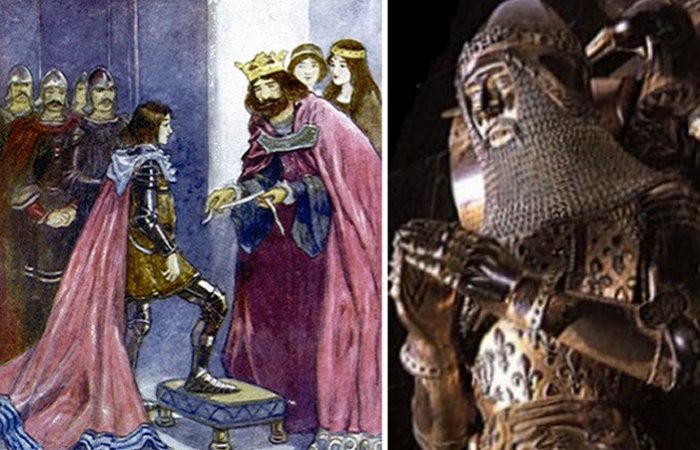Conny Waters - AncientPages.com - Edward of Woodstock (1330-1376), who became known as the Black Prince was feared, loved, and hated.
As the eldest son and heir of England’s King Edward III Plantagenet, he had a huge responsibility to fight against England’s greatest enemy, France. The Black Prince was very successful on the battlefield and showed tremendous courage. He was also cunning and intelligent and did not hesitate to lure the enemy into a deadly trap if he had a chance to do so.
Left: The Black Prince being made a Knight of the Garter. Credit: Public Domain - Right: The Black Prince. Credit: Public Domain
His battles are well-documented, but there is plenty of disagreement about his personality.
Why is the Black Prince after so many years still a controversial historical figure? Was he a truly evil or good man? Was he a greedy or generous person?
English and French historians present two completely different opinions of the Black Prince, whose tomb can be visited in the Canterbury Cathedral.
How Did The Black Prince Get His Name?
Edward of Woodstock’s nickname is a subject historians fail to agree on. French historians argue that Edward of Woodstock’s nickname can be traced to his dark character. He got the name Black Prince because his soul was black. He showed no mercy and he was heartless when he and his army plundered France.
The English explain the name in much simpler terms. They maintain the name Black Prince originates from the fact that Edward of Woodstock always wore black knight armor in battle.
By doing so, he was easily recognized among other knights dressed in shiny armor.
What Kind Of Person Was The Black Prince?
It would indeed be a surprise to learn the Black Prince’s enemy praised him as a good-hearted person considering how many atrocities he committed in France. It’s no wonder French historians and writers portray the Black Prince as a pure manifestation of evil.
According to contemporary authors, the Black Prince enjoyed conquering his enemies, as well as inflicting emotional and physical pain.
His plundering in France between 1355 and 1356 gave him a very bad reputation.
The French also accuse the Black Prince of being greedy beyond imagination. He left poor peasants and workers without any belongings and ordered the burning of downtowns and cities if inhabitants refused to give him all their possessions. He treated civilians in the most horrible and cruel manner. Chronicle writer jean le Bel said all men in the city of Caen had to witness how their mothers and sisters were murdered. The wife and daughters of each man had to suffer humiliation. As if this was not enough, the Black Prince also ordered the burning of their homes.
According to French historical records, the Black Prince executed 3,000 defenseless men, women, and children in the city of Limoges.
The storming of Limoges. Credit: Public Domain
The English records on the other hand provide the modern world with a much nicer picture of Edward of Woodstock. They explain the Black Prince was a true, generous gentleman who treated people fairly and opposed all kinds of abuses and exploitation.
It was also said that he was faithful to his wife and became furious when his knights mistreated prisoners of war.
Depending on whom you listen to, the English or the French, you’ll learn about the good and bad personality of the Black Prince.
How the Black Prince was in real life is today almost impossible to determine. Ancient sources present conflicting information, are mixed up, and often filled with nonobjective personal opinions.
Written by Conny Waters – AncientPages.com Staff Writer
Updated on August 6, 2021
Copyright © AncientPages.com All rights reserved. This material may not be published, broadcast, rewritten or redistributed in whole or part without the express written permission of AncientPages.com






